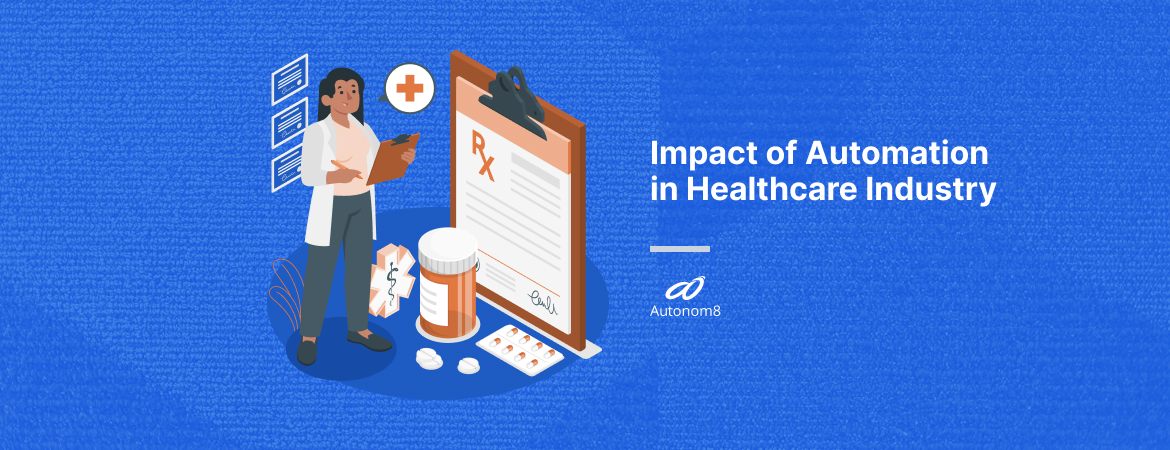Impact of Automation in Healthcare Industry

Uniphore Has Announced the Intent to Acquire Autonom8 to Enhance the Capabilities of Business AIView Announcement

Introducing automation has brought about many benefits in the healthcare industry. There is more to automation than just medical robots in the healthcare sector. Scheduling appointments, clinical assessment, diagnosis, treatments, prescriptions, aftercare, and invoicing are some of the stages handled by automation.
Automation enhances the quality of care and reduces costs significantly, therefore researchers, hospitals and doctors have started to incorporate automation in their line of work. As it can also handle huge operations of data and analysing patients, automation and AI are perfect for processing a lot of data and handling repetitive tasks.
Many areas are benefitted from automation. Both administrative and medical sides have opportunities where automation plays a main role.
Tedious administrative tasks that have to be handled around the clock can be managed by process automation. It allows humans to work on tasks that involve leadership and decision-making skills. Improved Electronic Health Record (EHR) machines facilitate the data extraction process of patients, thereby enforcing efficient patient care. This data can be generated in real-time and medical practitioners can access these records of their patients whenever needed. These records can be used to recognise relevant patient population data, manage patient research, enhance patient care, and train needed AI applications.
Automation in the healthcare sector streamlines various administrative processes like appointments, claims, and billing, which leads to improvement in patient management, increase in revenue, and lesser costs. As automation in the healthcare industry manages all the administrative tasks, staff can handle the patients and provide them with the proper care.
Automation has increased the quality of communication between patients and doctors. Chatbots have been introduced to handle any queries that the patient may have. With the involvement of chatbots, answering the questions of patients and scheduling their appointments have become easy tasks. As AI uses the natural language processing (NLP) feature, it has become easier to conduct necessary surveys and analyse the responses. This has caused a significant impact on the follow-up care quality.
Preventing an illness by following proper precautions will benefit the patient. By incorporating automation in the hospitals, medical professionals can make accurate diagnoses faster. National Center for Biotechnology Information has stated that “about 400,000 hospital patients experience some type of preventable harm each year,” with the cost of medical errors ranging between $4 billion and $20 billion annually”. Constant work stress and prolonged hours can cause doctors to commit mistakes. However, this can be avoided by using automation in hospitals, as AI implements evidence-based practices and improved clinical decision-making.
Visualization and 3D modelling use Augmented Reality (AR), which can help doctors in diagnoses, treatments, surgery and other procedures. It can be used on tablets and phones as applications, as all medical professionals can access them. Many medical institutions have started to use AI applications to minimise medical errors and improve accuracy in diagnosis. This ensures the patients do not receive wrong treatments. This greatly reduces medical malpractice, thereby reducing lawsuits, which saves time and money for the medical professionals.
The primary reason for introducing automation in healthcare industry is to reducing its expenses. Including automation in the billing processes can increase the collection rates. It can handle a lot of work involved in revenue cycle management (RCM) by working across various branches and streamlining the processes without any errors. This will significantly increase revenue to the hospitals by minimising the administrative costs. Medical professionals can complete their work within their shift, which reduces their stress and increase their efficiency. This also allows them to complete their work on-time, thereby reducing the payments to healthcare professionals.
Hospitals may experience a sudden influx of patients depending upon the situation. As the healthcare industry uses machine learning (ML), staffing can be adjusted if there’s an unexpected change in patient volume. It can also reduce the wait times for ambulances. AI can predict when the staff has to be increased by analysing the data from previous records, e.g., flu season.
During the Covid-19 pandemic, hospitals used automation to respond quickly and increase the capacity of the hospital buildings. It also helped in maintaining rules like social distancing. Reminders can be sent to patients and healthcare professionals automatically with the help of automation. It can help hospitals to work alongside the guidelines and emergencies effectively.
As more people seek healthcare services, medical professionals may not be able to meet the increasing demand for services. However, with automation, they can help the patients quickly. It also helps in providing accurate and timely services. With increasing number of uses from automation in the healthcare industry, both the hospitals and patients benefit from the greatly.
If you are interested in knowing more about automation and how it will revolutionise patient care, contact us.
Fill in your details and our executive will get in touch within 48 hours
Fill in your details and our executive will get in touch within 48 hours